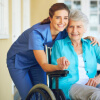Discover how to ensure a smooth transition for your elderly loved ones as they return home after a hospital discharge.
Understanding the importance of a well-planned hospital discharge process
A well-planned hospital discharge process is crucial for elderly patients transitioning back home after a hospital stay. It ensures that they receive the necessary care and support to continue their recovery in a safe and comfortable environment. Without proper planning, there may be a higher risk of complications or readmission to the hospital.
During the hospital stay, healthcare professionals assess the patient’s condition and develop a comprehensive care plan. This plan includes information about medications, follow-up appointments, and any necessary medical equipment. It is essential to understand this plan and its importance in order to facilitate a smooth transition back home.
By understanding the importance of a well-planned discharge process, you can advocate for your loved ones and ensure that they receive the necessary support and resources for a successful homecoming.
Discover strategies to enhance the experience of elderly individuals during their hospital stays with these valuable tips.
Preparing the home environment for the elderly patient’s return
- Remove hazards, create clear pathways, and install handrails.
- Organize medications and supplies for easy accessibility.
Preparing the home environment is crucial to ensure a safe and comfortable return for the elderly patient. This includes making necessary modifications to accommodate their needs and minimize potential hazards.
First, ensure that the living space is clean and clutter-free to reduce the risk of falls or accidents. Remove any loose rugs or obstacles that may obstruct their movement. Consider installing handrails in hallways and grab bars in the bathroom to provide additional support.
Additionally, make sure that essential items are easily accessible. Organize medications and medical supplies in a designated area. Arrange furniture to create clear pathways and remove any unnecessary furniture that may hinder mobility.
By preparing the home environment before the elderly patient’s return, you can create a safe and welcoming space for their recovery.
Coordinating care and support services
- Communicate with the healthcare team and involve caregivers.
- Explore community resources for additional support.
Coordinating care and support services is vital to ensure a smooth transition and continuity of care for elderly patients after hospital discharge. This involves collaborating with healthcare professionals, caregivers, and community resources.
First, establish open communication with the healthcare team involved in the patient’s care. This includes doctors, nurses, and therapists. Discuss the discharge plan, including medications, follow-up appointments, and any necessary home healthcare services.
It is also important to involve caregivers or family members in the coordination process. They can provide valuable support and assistance in the transition period. Consider discussing caregiving responsibilities, schedules, and any specific needs or concerns.
Furthermore, explore community resources that can provide additional support to the elderly patient. This may include home healthcare agencies, meal delivery services, transportation services, or support groups. Coordinating these services can ensure that the patient receives comprehensive care and assistance during their recovery at home.
Managing medications and medical equipment at home
- Organize medications using pill organizers or reminder apps.
- Ensure proper maintenance and accessibility of medical equipment.
Proper management of medications and medical equipment is crucial for the well-being of elderly patients at home. It helps prevent medication errors, ensure adherence to prescribed treatments, and maintain a safe environment.
Start by organizing medications in a pill organizer or using medication reminder apps. Set up a schedule for medication administration and make sure to follow the instructions provided by healthcare professionals.
If the patient requires medical equipment at home, such as oxygen tanks or mobility aids, ensure that they are properly maintained and accessible. Familiarize yourself with the usage instructions and any safety precautions.
Regularly check medication expiration dates and dispose of any expired or unused medications. Keep a record of medications, including dosage instructions and any potential side effects.
By effectively managing medications and medical equipment at home, you can promote the elderly patient’s safety and well-being during their recovery.
Promoting emotional well-being during the homecoming
- Encourage open communication and active listening.
- Engage in activities that promote social connection and mental stimulation.
The transition from hospital to home can be emotionally challenging for elderly patients. It is essential to promote their emotional well-being and provide the necessary support during this time.
Encourage open communication and active listening. Allow the patient to express their feelings, concerns, and fears. Offer reassurance and empathy, and validate their emotions.
Engage in activities that promote social connection and mental stimulation. Encourage visits from friends and family, or arrange phone or video calls if in-person visits are not possible. Encourage hobbies, reading, puzzles, or other activities that the patient enjoys.
Ensure that the patient has access to emotional support, such as counseling services or support groups. These resources can provide a safe space for the patient to discuss their emotions and receive guidance.
By promoting emotional well-being, you can help the elderly patient navigate the challenges of transitioning back home and support their overall recovery after a hospital discharge.
Contact us at 832-371-6600 to find out more about how we can help someone you love transition back into the home with our customized in-home care services.
Home Matters Caregiving proudly serves the Houston Metro area providing care for seniors wherever they call home.





